
12 minute read
Education & Equity
Michelson 20MM Foundation believes that equitable educational and economic opportunities are essential to activating humanity’s full potential. For more than a decade, it has served 20 million minds—the approximate number of postsecondary students in the United States—by advancing open educational resources, smart justice, student basic needs, digital equity, and intellectual property education.

Michelson 20MM launched in 2010 with an effort to relieve the burden of textbook costs on lowincome college students. Its work has since grown to include investing in tech entrepreneurs, changemakers, and policy with the goal of catalyzing scalable innovations in the knowledge economy and accelerating progress toward a more just world.
The foundation continues to expand into other verticals, challenging social inequalities and injustices in fields beyond education.
Supporting Open Educational Resources
When Dr. Gary K. Michelson learned from professors at Santa Ana College, a two-year public institution in Orange County, California, that in 2010 numerous bright and qualified students failed to complete their degrees each term simply because they could not afford their textbooks, he decided to take action.
Dr. Michelson understood these students’ plight, having himself experienced financial hardships as a college student that pushed him to work multiple jobs while in school. He began by contributing his own resources toward textbook scholarships but was committed to finding a more enduring solution. Dr. Michelson joined forces with other forward-thinking philanthropies to tackle this problem and in 2010 awarded a grant to a new nonprofit open educational resources (OER) publisher, OpenStax, to produce a catalog of free open textbooks for students. Today, OpenStax publishes more than 40 titles for college and high school courses across science, math, social sciences, business, and the humanities. It has served more than 14 million students and saved them $1.2 billion cumulatively with its resources.
Analyzing the Automatic-Billing Framework
Working with the United States Public Interest Research Group Education Fund (U.S. PIRG), Michelson 20MM commis sioned a report analyzing the textbook industry’s new automatic-billing framework, also known as “inclusive access,” which has been adopted by major publishers as a tactic for recouping market share and increasing sales revenue. The report found that this new model fails to save students money and reduces faculty and student choice around instructional materials.
In spring 2020, nine class-action lawsuits were filed against major textbook companies and retailers. The lawsuits sought to protect students and independent booksellers, with plaintiffs alleging that the Big Three publishers (Cengage, McGraw-Hill, and Pearson) and the two biggest college bookstore chains (Barnes & Noble and Follett) were using automatic billing to create a “cartel” to keep prices high. U.S. PIRG’s report was cited in at least six of the suits, all of which were consolidated into a class action. “Our interests are certainly aligned: advocating for the reseller market,” says a managing partner at the law firm representing two students in one of the cases. “That’s what ultimately will drive the prices down.”

Smart Justice Reform
Each year, more than 600,000 individuals are released from state and federal prisons nationwide. Those who find work after their release earn a median annual wage of $10,000—the estimated cost of a year of community college. Two decades of research concludes that higher education in prison programming reduces recidivism, resulting in taxpayer savings, community safety, and economic prosperity. Additionally, higher education in prison programming improves the conditions of confinement for inmates and correctional staff.
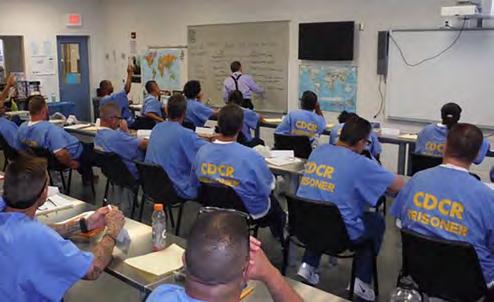
Students in a Southwestern College class at the Richard J. Donovan Correctional Facility. Launched with support from Michelson 20MM, UC Irvine LIFTED’s initial cohort will recruit from Southwestern students in prison with associate degrees ready for transfer.
Knowing the transformative effects of higher education, Michelson 20MM launched the Smart Justice Initiative (SJI) in 2019. SJI invests in justice innovation that incentivizes and promotes higher education and career success as a catalyst for individual and systemic change. Through a Michelson Spark Grant, Root & Rebound trained staff at key California higher education institutions and licensing boards on best practices for implementing “Ban the Box” and Fair Chance Hiring policies, which increased educational opportunities for 8 million justice-involved students. Additionally, through a Michelson 20MM Spark Grant, SJI kickstarted the first University of California Bachelor of Arts program in prison through the University of California, Irvine (UCI). This initiative lays the groundwork for additional UC campuses to offer B.A. programming in prisons. Its investments include initiatives that support pregnant and parenting students, improve student access to public benefits, and develop recommendations to create permanent funding sources for student basic needs. Through a Michelson Spark Grant, California State University, Long Beach will conduct a landscape analysis of the CSU system and will develop a best practices model for campuses seeking to become family-friendly. Additionally, a grant awarded to the Institute for College Access and Success will result in a comprehensive study analyzing the true cost of college in California by elevating students’ voices.
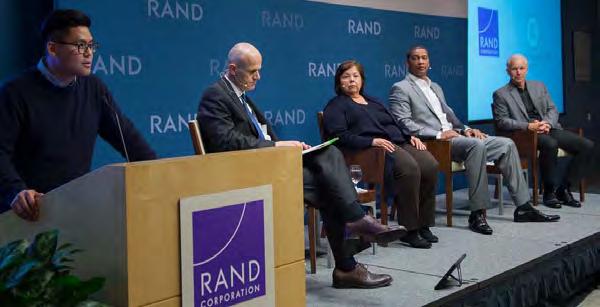
Phillip J. Kim of Michelson 20MM Foundation, left, introduces a January 2019 panel discussion about the costs and benefits of using education to stop the prison revolving door. The panel included moderator Frank Stoltze of KPCC; Lois Davis, RAND senior policy researcher; Kenyatta Leal, founding member and first graduate of The Last Mile, which prepares inmates for reentry by providing them with marketable skills; and Chris Redlitz, managing partner with Transmedia Capital and founder of The Last Mile.
Student Basic Needs
College students face more financial emergencies than ever before, and institutions of higher education nationwide are struggling to pivot and offer necessary support. Consequently, many students fail to complete their degree programs as they are faced with the decision to fund their basic needs or pursue their education.
In response, Michelson 20MM is working to increase persistence and graduation rates through systems change, technological innovations, research, and policy that helps students meet their basic needs.

FRANCISCO RODRIGUEZ (pictured above), Chancellor, Los Angeles Community College District
Increasing Digital Equity
Equitable access to devices, broadband connectivity, and digital literacy resources is essential to ensuring postsecondary students in California have the resources necessary to succeed. The COVID-19 pandemic underscored the starkness of the digital divide between those who have internet access and those who don’t. According to the California Department of Education, as many as 1 million students lacked either the computers or internet access needed to participate in remote learning at the start of the 2019-20 school year.
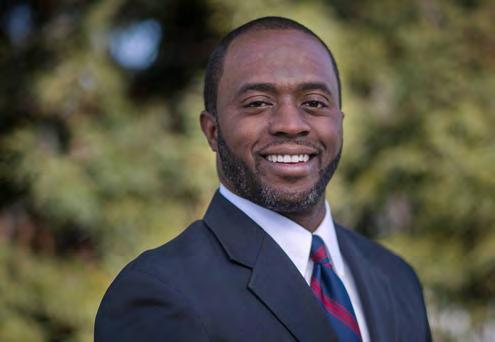
TONY THURMOND, California State Superintendent for Public Instruction (pictured above)
Leveraging public, philanthropic, and practitioner partnerships, Michelson 20MM operates as a catalyst and connector to create equitable access to devices, the Internet, and culturally relevant curricula for all students. Michelson 20MM has made two direct investments in the digital equity space: focusing on closing the digital divide for Los Angeles Community College District students by providing thousands of connected devices, home Internet access, and digital literacy; and mapping the efficacy of California college- and universityled efforts to support postsecondary students academically and holistically through the pandemic via research led by The Education Trust-West.
FOCUS ON CONNECTING CALIFORNIA
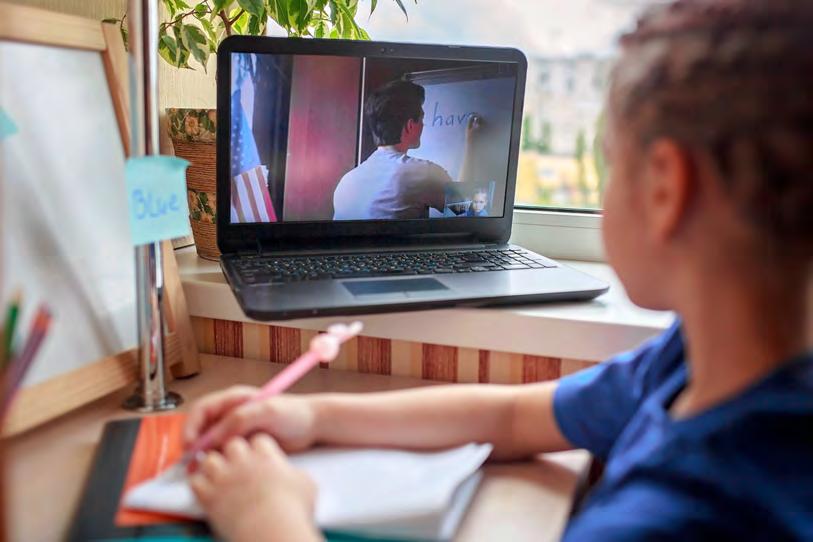
Launched in 2020 under Michelson 20MM’s Digital Equity Initiative, the Connecting California: Solving the Digital Divide learning series offers insights from business leaders, digital equity practitioners, philanthropic investors, and government officials—all representing different facets of the landscape devoted to building equitable solutions to the digital divides at local, state, and national levels.
“The Digital Divide: Yesterday, Today, and Tomorrow” launched the Connecting California series on August 6, 2020. The conversation sought to build a foundation for understanding contexts and precedents in digital (in)equity. Panelists included Lande Ajose, California Governor Gavin Newsom’s senior policy adviser for higher education; Jeanne Holm, deputy mayor for budget and innovation for the city of Los Angeles; and other leading practitioners in digital equity and inclusion.
By bringing together digital equity practitioners, philanthropic investors, and policymakers from San Jose, Chicago, Detroit, and Los Angeles, “We were able to get these people out of their silos a little bit and have that conversation where they discover real commonalities around what they are doing,” says Phillip J. Kim of Michelson 20MM Foundation.
“Stronger Together: The Role of Cross-Sector Partnerships in Digital Equity” took place on September 17 and focused on understanding how effective public-private partnerships can be designed and implemented at the local and regional levels. Panelists included California State Senator Lena A. Gonzalez; Jennie Huang Bennett, CFO for the city of Chicago; and digital innovation experts from Los Angeles, Detroit, and the Bay Area.
COVID-19 illuminated the widespread effects of digital inequities: Whether it’s access to a device, high-speed internet, or digital literacy, many of the nation’s systemic problems can be traced to the same root cause. “Philanthropy Post-COVID: Where Do We Go From Here?” took place on November 19 and brought grantmakers, public-private liaisons, and venture investors into the conversation to discuss how society can increase digital equity in a postCOVID world. Panelists included Jarrett Barrios, senior vice president of strategic community and programmatic initiatives for the California Community Foundation; Adrianne B. Furniss, executive director and trustee of the Benton Institute for Broadband & Society; David Rattray, president and CEO of UNITE-LA; Priyanka Sharma, project director at World Education Inc. and co-director of Digital US; Leon Wilson, chief of digital innovation and chief information officer at the Cleveland Foundation; and Jory Wolf, vice president of digital innovation at Magellan Advisors.
FOCUS ON MICHELSON SPARK GRANTS
The Michelson Spark Grants program is an innovative, just-in-time grant-making process designed to fill the urgent needs of organizations that are well-aligned with the mission of Michelson 20MM Foundation. Launched in 2019, the program accelerates the traditional decisionmaking process with a commitment to decide on each application within 15 business days. To date, Michelson 20MM has issued 27 grants across six funding cycles, the latest of which centers on college affordability and student basic needs.
“In many ways, this is a grand experiment to innovate within grantmaking, which has been relatively stagnant,” says Michelson 20MM CEO Phillip J. Kim. “Our experience with grantees over the first six cycles—the quality of opportunities and the early impact of the programs funded—has validated critical parts of our initial hypothesis that targeted, rapid-response grants can seed important proof-of-concept projects or even exponentially amplify kernels of promising programs.”
Smart Justice
Root & Rebound (R&R), a legal advocacy center focused on ending the harm caused by mass incarceration, was at the forefront of the “Ban the Box” movement. R&R’s Incarceration to Education Coalition convenes formerly incarcerated students and graduates, nonprofit organizations, and advocates to increase equitable access to higher education institutions, degrees, and resulting career pathways for current and prospective students with criminal records.
As a result of this collaborative effort, California successfully Banned the Box in Higher Education (BTBHE), removing the question regarding an individual’s criminal history on college applications in public, private, undergraduate, and graduate degree-granting programs. A new project with R&R facilitated policy implementation of BTBHE and Fair Chance Licensing reform that went into effect in 2020. The Spark Grant they received empowered R&R to train staff at key California higher education institutions and licensing boards on best practices for implement ing the “Ban the Box” and Fair Chance policies. Root & Rebound’s work will also ensure justiceinvolved students are aware of their rights in career paths requiring licensure once they enroll in a higher education program.
Economic Opportunity Within Reach
An essential component of the Michelson 20MM Smart Justice Initiative is economic security. In the workforce, people with criminal records are often siloed into accepting low-skill jobs that keep them, their families, and communities in poverty. Michelson 20MM is committed to disrupting this through sector-specific workforce strategies that invest in high-growth, high-wage-earning potential careers for justice-involved individuals.
In 2020, Michelson 20MM awarded Spark Grants to 2nd Call, Forestry and Fire Recruitment Program, and the Anti-Recidivism Coalition. 2nd Call innovates on opening the construction trades and well-paying union jobs through a trauma-informed workforce approach to success. Similarly, the Forestry and Fire Recruitment Program ensures that justice-involved heroes fighting fires on the West Coast while detained in fire camps have the opportunity to pursue firefighting as a career after their release. The Anti-Recidivism Coalition is advancing innovative workforce programming in green tech and the electric vehicle industry in partnership with postsecondary institutions. Careers in firefighting, construction, and green tech will set justice-involved candidates up for well-paying vocations—ensuring that economic prosperity is within reach.
Dr. Gary K. Michelson
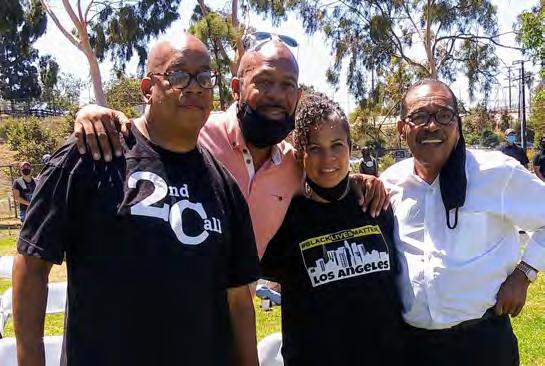
From left, 2nd Call Executive Director Skipp Townsend, at a town hall on policing in July 2020 with Aqeela Sherrills, peace advocate and activist; Melina Abdullah, co-founder of Black Lives Matter Los Angeles and former chair of Pan-African Studies at California State University, Los Angeles; and Herb Wesson, former Los Angeles City Councilmember.
COVID-19 Response
Michelson 20MM is committed to helping students, faculty, and administrators as everyone navigates the challenges presented by COVID-19.
Widely recognized as the nation’s leader on college affordability advising and training, uAspire was awarded a Spark Grant in March 2020 to provide virtual advising to over 12,000 students and online technical assistance support for hundreds of practitioners in response to the pandemic. With headquarters in Boston and offices in New York City and Oakland, California, uAspire works to ensure students minimize their prospective debts and make responsible financial decisions regarding postsecondary choices.
To support chronicling MIT’s digital transformation and uncover insights for the larger education sector in light of the new reality, Michelson 20MM awarded a Spark Grant to MIT’s Office of Open Learning. The grant helps preserve knowledge of the process of transforming physical classes into online courses in the wake of COVID-19. The initiative also seeks to highlight best practices that educators at other institutions can implement when undertaking their journey to digitization.
The Institute for the Study of Knowledge Manage- ment in Education (ISKME) is on a mission to improve learning and collaboration in education through social science research, research-based innovations, and by assisting schools, colleges, and universities in developing open education environments. Michelson 20MM awarded ISKME a Spark Grant to accelerate the use of open educational resources for distance education.
Student Basic Needs
Backed by a newly awarded Spark Grant, Swipe Out Hunger is leveraging its network of students and administrators to help create effective systems for disbursing and publicizing federal emergency aid to students across its member campuses. The organization is developing digital training tools and strategies to ensure responsive, transparent, and equitable distribution of funds. Swipe Out Hunger also is consulting with school administrators on the design of their emergency aid programs.
A Spark Grant was awarded to Believe in Students and the Hope Center for College, Community, and Justice to support their legislative educational outreach and policy efforts, including their work to increase access to Supplemental Nutrition Assistance Program (SNAP) benefits such as food stamps and emergency aid for college students. “Today’s college students have enormous poten-tial, and with stronger support from state and federal policies they will succeed in transforming the lives of their families and communities,” says Dr. Sara Goldrick-Rab, Temple University professor of sociology and medicine and founder/president of the Hope Center for College, Community, and Justice. “We appreciate the support from Michelson 20MM for this effort to advance systemic change.”
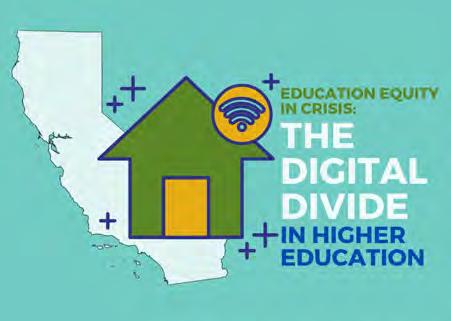
Through a Spark Grant from Michelson 20MM, the Education Trust–West generated a map detailing the higher education digital divide in California and the impact of COVID-19. An estimated 109,000 students from lower-income households and 134,000 students of color lack access to a device and are unable to adequately engage in distance learning.






